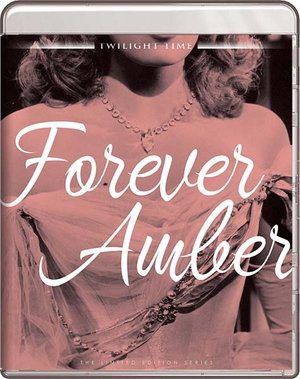
A full decade before its hugely successful Peyton Place managed to poke a few holes in the brick walls of alleged decency, 20th Century Fox was already turning a controversial bestseller into a major ‒ however sanitized ‒ motion picture. Previously in history, Kathleen Winsor’s 1944 novel Forever Amber had been condemned by the Hays Office, but that hardly stopped top Fox man Darryl F. Zanuck from securing the movie rights for the book immediately after its publication and turning something racy into a big-budgeted epic. Three years later, Fox’s Forever Amber premiered. It would prove to be the biggest hit of 1947, and gained a lot of attention in the process.
Said attention, however, was not entirely limited to the success of the film’s reception. Prior to its release, Forever Amber was met with a heap of scrutiny from the National Legion of Decency ‒ also known as the Catholic Legion of Decency ‒ which resulted in many (annoying) changes to the finished product in order for the film to “pass” the board’s ultra-conservative stance. Even after having most of its “dirtier” bits scrubbed clean (or excised altogether), Fox’s lavish, star-studded production of Forever Amber still managed to attract audiences around the world thanks to a marketing campaign which compared the film to Gone with the Wind.
Quite impressive for a troubled production which fell into near-obscurity shortly afterward.
Spanning the distance of several periods in English history, Forever Amber finds the great Linda Darnell as the feisty eponymous lass. Abandoned by her parents as an infant and raised in a repressed rural community (something I can wholly relate to), a grown-up, defiant Amber sets her sights on a swashbuckling cavalier named Bruce (Cornel Wilde, sporting a large black wig which had me dubbing him “Turkish Jeff Goldblum” throughout my viewing of the film). Alas, Amber really doesn’t catch Bruce’s eye: though they do share a romantic encounter or two, her peculiar methods of getting ahead in the world by sleeping with powerful men greatly displeases him to say the least.
While Amber would have no trouble cutting it the world today, her antics are completely unfavored in the 17th Century.
After being dejected by her “true love” when he sets sail for the New World across the Atlantic, Amber sets off on a series of misadventures. She gets ripped-off by Batman butler Alan Napier (appearing in a minor part as a smooth-talking crook), spends time in Newgate Prison (where they serve booze, apparently), joins forces and busts out of prison with highwayman John Russell before giving birth to Bruce’s bastard son (later portrayed by Turkish Jeff Goldblum’s Mini-Me). She also becomes a popular actress thanks to a feller named Captain Morgan (Glenn Langan), whom she marries in a bout of depression, and even saves Bruce from the dreaded Plague.
The Great Fire of London also plays a part here, following Amber’s disastrous marriage to the very possessive (and very impotent) Earl of Radcliffe (played to the hilt by Richard Haydn). Eventually, Amber succeeds in sleeping her way to the top, becoming a mistress of King Charles II (the ever-awesome George Sanders, whose performance more than makes up for all of the stuff the Church cut out). Richard Greene ‒ long before those dark, dire days when he would pop up in movies such as Jess Franco’s Fu Manchu series ‒ co-stars as Lord Almsbury: the one man who would gladly take Amber as-is, but never to any avail. Young Jessica Tandy, Ann Revere, and Leo G. Carroll also appear.
Clocking in at a whopping 138 minutes, Forever Amber was (eventually) helmed by Otto Preminger after the film’s original director, John M. Stahl, was canned. Initially, Peggy Cummins was slated to star, before proving to be too inexperienced for the (obviously) demanding role. Another casting casualty of the film was the one and only Vincent Price, who started out as Lord Almsbury in Stahl’s film before being recast in a smaller role in Preminger’s version. Unfortunately, neither of Price’s performances would see the light of the projector: his footage in the finished work wound up on the cutting room floor.
But even this “Priceless” film still deserves a viewing. Thankfully, Twilight Time has added Forever Amber to its ever-expanding library of Limited Edition releases on Blu-ray. Having previously made its way overdue digital home video debut as part of Fox’s MOD Cinema Archives collection, Twilight Time’s High-Definition presentation of Forever Amber hails from the 20th Century Fox vault, and is undoubtedly a marked improvement over the latter. Sporting an MPEG-4 AVC 1080p encode and presenting the film in its original 1.37:1 aspect ratio, Preminger’s Technicolor epic shines throughout here, and the DTS-HD MA 1.0 soundtrack delivers accordingly.
Removable English (SDH) subtitles are included with this release, which is limited to 3,000 copies. Twilight Time’s selection of special features begin with their staple isolated score offering; in this instance, the work of composer David Raksin may be heard in DTS-HD MA 2.0. There’s also a classic episode of A&E’s Biography to be found here. Aptly entitled Linda Darnell: Hollywood’s Fallen Angel, the 1999 TV documentary explores the rise and unfortunate conclusion to one very alluring actress. Lastly here are liner notes by Twilight Time’s resident film historian, Julie Kirgo. Amazingly, Twilight Time’s other common extra ‒ a theatrical trailer ‒ is missing here.
But, don’t let that stop you from checking out Forever Amber. After all, where else are you going to see Cornel Wilde looking like Turkish Jeff Goldblum?